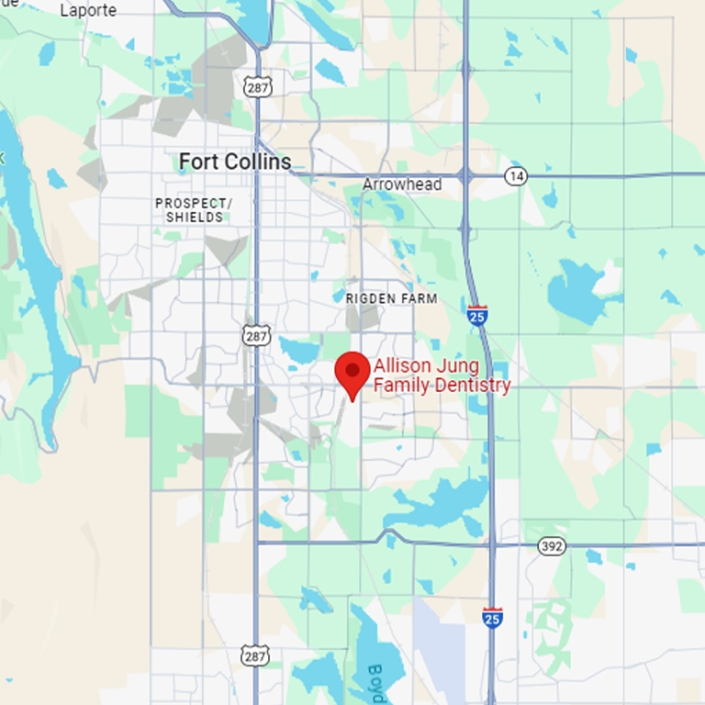Tooth Extraction in Fort Collins CO
Although Dr. Allison Jung does everything possible to preserve your natural teeth, sometimes it is necessary to undergo tooth extraction in Fort Collins, CO. We highlight some of the most common reasons for tooth extraction and what you can expect during your appointment below.
Top Reasons for Tooth Extraction
Extracting a permanent tooth requires Dr. Jung to loosen the tooth from its bony socket with equipment known as a dental elevator and then remove it with forceps. Dr. Jung typically does tooth extractions herself without referring patients to an oral surgeon.
Badly decayed tooth
When a large portion of your tooth has decayed, treating it with a standard cavity-filling material is no longer an option. At this point, the tooth has sustained damage beyond repair and must come out.
Fractured or cracked roots
The root of your tooth can become cracked without you realizing it. The tooth must be extracted because fractured roots cannot protect your teeth and gums from plaque, tartar, and bacteria.
Impacted tooth
We refer to a tooth that erupts but does not have adequate space to grow in as an impacted tooth. Typical symptoms of an impacted tooth include bleeding, soreness, swelling, and tenderness to the touch.
Wisdom teeth, which attempt to grow behind the back molars, are the most common type of impacted tooth. Not everyone experiences impacted teeth, nor do they necessarily have all four wisdom teeth erupt. When wisdom teeth do erupt, it is typically between the ages of 17 and 21. Dr. Jung examines the back of the jaw for impacted wisdom teeth over the years and documents her findings.
Infection
An infected tooth is dangerous because the bacteria can spread from the original source to other body parts by traveling through the blood. Infection can occur when a tooth decays badly, allowing bacteria to penetrate the tooth enamel. In some cases, Dr. Jung can save the tooth with a root canal, but she must extract the tooth if the root canal is ineffective or the infection goes untreated.
Severe gum disease
Lack of attention to oral hygiene, such as regular brushing and flossing, and not consuming a healthy diet all contribute to severe gum disease, also known as periodontitis. Bone loss occurs as gum disease progresses, and the gums start to separate from the teeth. Once your gums pull away from your teeth, you risk a significant infection. Extracting the tooth prevents infection from spreading in your mouth and through the blood to other body parts.
Tooth extraction before orthodontic treatment
People who need braces often have overlapping teeth that Dr. Jung must extract to provide enough room for the other teeth to shift into a new position.
Tumors or cysts
If you have oral cancer or benign growths, removing one or more teeth may be part of your treatment plan.
What to Expect During Your Tooth Extraction Appointment
Regardless of why you need one or more teeth extracted, preparation for the procedure is always the same. Dr. Jung or one of her assistants injects anesthesia into your gums and lips to ensure that you remain comfortable while she extracts your tooth. Next, she makes several small incisions on your gum line to expose the tooth that requires extraction. These steps allow her to drill in the area.
Dr. Jung then uses a dental elevator and forceps to remove the tooth from its socket. This step takes anywhere from 20 to 60 minutes, depending on the anatomy and location of your tooth. Once your tooth is out, she places a piece of gauze in your mouth and asks you to bite down on it to help control the bleeding. We will send you home with additional gauze pads, and you should place a clean one in your mouth when the old one becomes soaked with blood.
Recovery from Tooth Extraction
Bleeding, swelling, and pain are common after this procedure because your mouth has experienced significant trauma. Placing an ice pack on your cheek should help relieve some swelling. If the pain becomes too severe, you can take ibuprofen or acetaminophen.
Please contact Dr. Jung to ask her to write you a prescription for stronger pain relief medication if you do not get enough relief from over-the-counter medications. You should also contact Allison Jung Family Dentistry if bleeding, swelling, or pain lasts longer than three days.
Plan to stick to a soft foods diet for the first few days after oral surgery and avoid using a straw to consume beverages. The straw’s suctioning power can lead to a painful dry socket that requires further dental treatment.
Please let us know if you have additional questions about tooth extraction in Fort Collins, CO, or if you would like to schedule an appointment.

